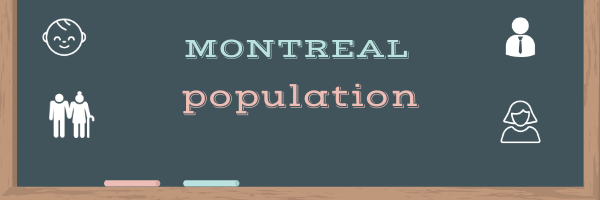
Montreal is a city of Quebec province in Canada. Montreal is Canada’s second populated city with an estimated population of over 1.7 million people. The city is named after Mount Royal. It is in the southwestern Province of Quebec, Canada, on the St. Lawrence River in Montreal and the surrounding small islands, is the economic centre of Quebec, Canada, the main port, is the largest city in the province. The broader metropolitan area had a population of 4,098,247 in 2016.
Based on our research, Montreal population will reach 1.788 Million by end of 2025.The calculation is based on the average growth rate of 0.58% over last 13 years since 2011. We believe using the recent years’ figures (see the table in next section) will make the estimation more accurate. The estimation will adjust once Statistic Canada publishes census data.
Population Growth of Montreal
Looking back last 13 years of Montreal’s population, the growth rate is very slow but steady ranging from 0.41% to 0.90%, adding around 7,000 to 15,920 people each year to the overall population. Lot of workers was moving to Montreal to take advantage of employment opportunities there, which contributes to the population growth. The population difference between census year 2011 and 2016 is 55,000, that means the population had increased by 3.9% over 5 years.
| Year | Population (Million) | Growth Rate |
| 2011 | 1.650 | n/a |
| 2012 | 1.661 | 0.67% |
| 2013 | 1.670 | 0.54% |
| 2014 | 1.685 | 0.90% |
| 2015 | 1.695 | 0.59% |
| 2016 | 1.705 | 0.59% |
| 2017 | 1.712 | 0.41% |
| 2018 | 1.725 | 0.76% |
| 2019 | 1.732 | 0.41% |
| 2020 | 1.739 | 0.45% |
| 2021 | 1.750 | 0.63% |
| 2022 | 1.76 | 0.51% |
| 2023 | 1.768 | 0.45% |
| 2024 | 1.778 | 0.57% |
Demographics of Montreal
Montreal’s ethnic groups include Ireland, Italy, The Jewish, Greek, Arab, Asian, Latin American, Haitian and Portuguese, and are populated by almost all the countries of the world. Montreal’s Chinese population in 2016 was 82,665, or about 5.1% of the total population.
The religious makeup of Montreal is: Christian (65.8%), No religion (18.14%), Muslim (9.6%), Jewish(8.6%), Buddhist(2.0%), Hindu(1.4%),Sikh(0.03%),Other(0.3%).
From age prospective, in 2016, Children under the age of 14 (approximately 619,000) of the Montreal population account for 18.06 per cent of the total population, and those aged 65 and over (approximately 443,000) account for 12.92 per cent of the total population.
If we look at urban area, there is a population of 1,942,247 in the urban agglomeration, including all of the other municipalities on the Island of Montreal. The broader metropolitan area had a population of 4,098,247. Population distribution of ethnic groups in Montreal in 2016 are as follows: French 936,990, German 78,315, Polish 51,920, Italian 260,345, Indian 74,565 Portuguese 46,535, Irish 216,410, Quebec 72, 445, East Indian 39,305, English 148,095, Jews 68,485, Romanians 36,275, Scots 119,365, Greeks 61,770, Russians 35,800, Haitian 85,785, Spaniard 56,770, Vietnamese 35,050 ,Chinese 82,665, Lebanese 53,455, Moroccans 33,270.
Population Density of Montreal
Montreal’s population density is 3,889 people per kilo square meter, which is ranking the most populated city in Canada.
Facts About Montreal
- The lowest temperature ever recorded in Montreal was -37.8°C (-36°F) on January 15, 1957. The record low with windchill was -49.1°C (-56°F) on January 23. 1976.
- Montreal is the second-largest primarily French-speaking city in the developed world, after Paris.
- The five most numerous visible minorities are Black people (10.3%), Arabs, mainly Lebanese (7.3%), Latin Americans (4.1%), South Asians (3.3%), and Chinese (3.3%).
- Montreal’s sister city is Hiroshima.
- While Montreal is one of the five largest French-speaking cities in the world, most of the population is bilingual. Many people speak a third language.
- The city is named after Mount Royal, the triple-peaked hill in the heart of Montreal that rises to 764 feet above sea level.
- Montreal is one of the most important economic centres in Canada. In 2013, the city’s regional gross domestic product amounted to $189.3 billion, largely thanks to Montreal’s advanced aviation, finance, design and film industries.
- In 2006, Montreal was named “City of Design” by UNESCO. In 2017, Montreal was named the world’s best city to study by the UK Higher Education Survey.
References
The following links provide data for this topic:
- City of Montreal: https://montreal.ca/
- Statistics Canada: https://www12.statcan.gc.ca
- Government of Quebec: https://www.quebec.ca
